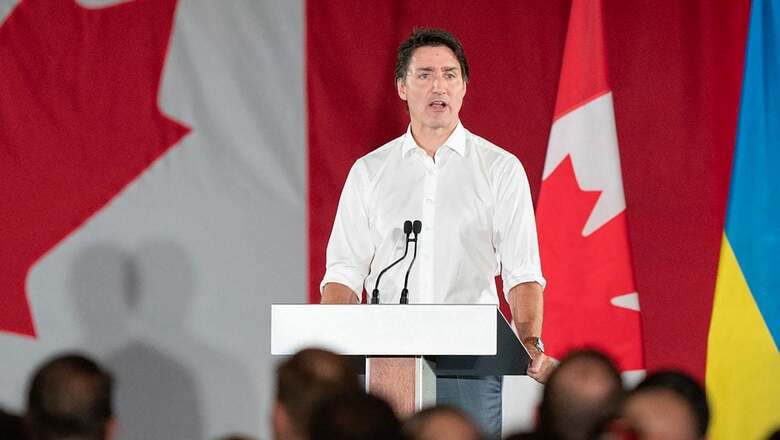
views
Under the Vienna Convention, India is within its rights as the host country to decide on the size of a foreign mission on its soil. The size cannot be unilaterally decided by a foreign country. It must correlate with the scope and quality of bilateral ties. Political, economic, trade, scientific, cultural exchanges, tourist flows, educational ties, defence cooperation, and so on, can determine the size of missions.
The principle of reciprocity is important. The number of consulates in each other’s country is especially based on this principle. If relations with a particular country are problematic at the political level, as in the case of Pakistan, for instance, the size of the foreign mission is strictly controlled. There is always a concern about the intelligence activities of a foreign mission, even that belonging to a friendly country.
Our problems with the Justin Trudeau government on the issue of its tolerance, even connivance, with the anti-India activities of pro-“Khalistani” extremist Sikhs on its soil that promote secessionist violence in India have come to a head with Prime Minister Trudeau publicly accusing India, without evidence, of having a hand in the killing of Hardeep Singh Nijjar, a fugitive from Indian law who was campaigning for “Khalistan” and was involved in instigating terrorist violence in India.
Imbued with a sense of righteousness and an exaggerated sense of self-importance, as well as an inflated belief in Canada’s international clout as a G7 country, Trudeau underestimated India’s reaction to his provocation.
India retaliated by reciprocally expelling a Canadian diplomat, castigated Canada for providing a safe haven for terrorists, drug traffickers and human traffickers, for failing to provide adequate security to its diplomats in Canada, and for interference in India’s internal affairs. It suspended issuing visas by our missions in Canada and, most importantly, demanded parity in the number of diplomats stationed in each other’s country. It did not publicly mention either the numbers or a date for compliance. Eventually, 41 Canadian diplomats had to leave India by October 20 to avoid their diplomatic immunity being revoked if Canada defied India’s demand.
India has justified its action under Article 11.1 of the Vienna Convention, which allows the size of a foreign mission to be kept within limits considered by the receiving State to be reasonable and normal, having regard to circumstances and conditions in the receiving State and to the needs of a particular mission.
The position taken by Canada’s Foreign Minister that India’s “unilateral revocation of the diplomatic privilege and immunity is contrary to international law” is a dishonest one. India has stated that it has engaged with the Canadian side on the issue for over a month in order to work out the details and modalities to ensure the implementation of parity in diplomatic presence. Given India’s clear position and Canada’s obligation under international law to abide by the receiving State’s demand, international law would have been violated if Canada had refused India’s demand.
The consequence of defiance would have meant the loss of diplomatic status of its personnel, who would then be treated as individuals staying in India illegally and therefore liable to be deported. If Canada’s tactics were to delay acting on the demand for parity in the hope of mobilising external pressure on India to modify its decision, that plan has been thwarted.
Trudeau has engaged in his habitual grand-standing by calling India’s action as “contravening the basic principle of international law and democracy” and stating that it is something that “all countries in the world should be worried about”. It is surprising that neither he nor his Foreign Minister have been adequately briefed by their officials on the provisions of the Vienna Convention. This kind of shooting off the hip politically brings further discredit to Canada.
To claim that India’s action contravenes democracy is empty rhetoric, as if the use of the word “democracy” puts Canada in a superior moral position. Does Trudeau think that the Vienna Convention, which India has relied on, is violative of democracy? Should “all the world be worried about” India’s action, as Trudeau claims?
If by the world he means Five Eyes, it is another matter. But if he means the rest of the world, especially the Global South, then he is mistaken. Many may rejoice at India’s decision to put Canada in its place, as they have long suffered on account of the West weaponising democracy to interfere in the internal affairs of others. As it happens, the leader of the opposition in Canada has slammed Trudeau for destroying Canada’s ties with many countries, including India, with his unprofessional conduct of affairs.
Canada’s position has been echoed by the US and the UK, indicating close coordination. This is neither a bilateral matter between India and the US nor one between India and the UK. Their interference in a bilateral matter between India and Canada is wrong. India has not invoked the Vienna Convention to demand that the missions of the US and the UK in India should have parity with our missions in their countries, even though the reality is that their missions in India, especially that of the US, far exceed the size of the Indian missions on their soil.
Surely, the legal departments of the Foreign Offices of the US and the UK are expected to do their homework better about the articles of the Vienna Convention. That the US should “expect” India to uphold its obligations under the Vienna Convention, including with respect to immunities and privileges of accredited Canadian diplomats, when they well know that India is upholding its rights under the Convention is pure politics.
The statement by the UK Foreign Office is more objectionable, as it is also presumptuous. The UK does not “agree with the decisions taken by the Indian government”, as if India sought or needed its agreement to exercise its rights under the Convention. The UK objects to the “unilateral removal of privileges and immunities” as not being consistent with the “principles and effective functioning of the Vienna Convention”. It then adopts a patronising tone by expecting “all states to uphold their obligations under the Convention”, and asking India to “engage with Canada on its independent investigation” into Nijjar’s death. Who is the UK to demand this?
Both the US and UK statements resort to diplomatic triteness in saying that resolving differences requires communication and diplomats on the ground. Our differences with Canada over the safe havens it gives to extremists threatening the sovereignty and security of India are long-standing. Canada has not acted on the several dossiers on these elements handed over to it. Our extradition requests have been ignored. Now there are death threats against our diplomats and our political leaders by these criminals. Despite Canada having had an inflated number of diplomats on the ground in India these differences have not been resolved. Worse, as Jaishankar has now said at his level, Canadian personnel have been interfering in India’s internal affairs. He has warned that information on this will come out in the public domain in due course.
Ironically, the UK’s record of interference in our internal affairs and providing safe havens to anti-Indian extremists is much worse than Canada’s. Violent demonstrations in front of our High Commission by “Khalistanis” in league with local Pakistani elements are allowed by the UK authorities despite our protests. The UK also does not meet our extradition requests. Such extremist elements are also active in the US. Our mission in San Francisco has been attacked twice. The Ministry of External Affairs has let the UK get away with its uncalled-for statement.
In 2018, the UK expelled 23 Russian diplomats. Russia responded by demanding that British and Russian embassies be of equal size and asked more than 50 British diplomats to leave the country. This was done. In 2017 parity was achieved between US and Russian missions in each other’s country. The State Department in its statement at that time said nowhere that this violated the Vienna Convention Between 2020 and 2023 the US expelled 223 Russian diplomats.
Why then lecture India? The usual double standards? A non-Western country cannot throw the book at a misbehaving Western G7 country?
Kanwal Sibal is a former Indian Foreign Secretary. He was India’s Ambassador to Turkey, Egypt, France and Russia. Views expressed in the above piece are personal and solely that of the author. They do not necessarily reflect News18’s views.

















Comments
0 comment